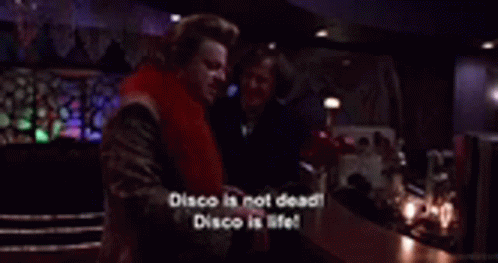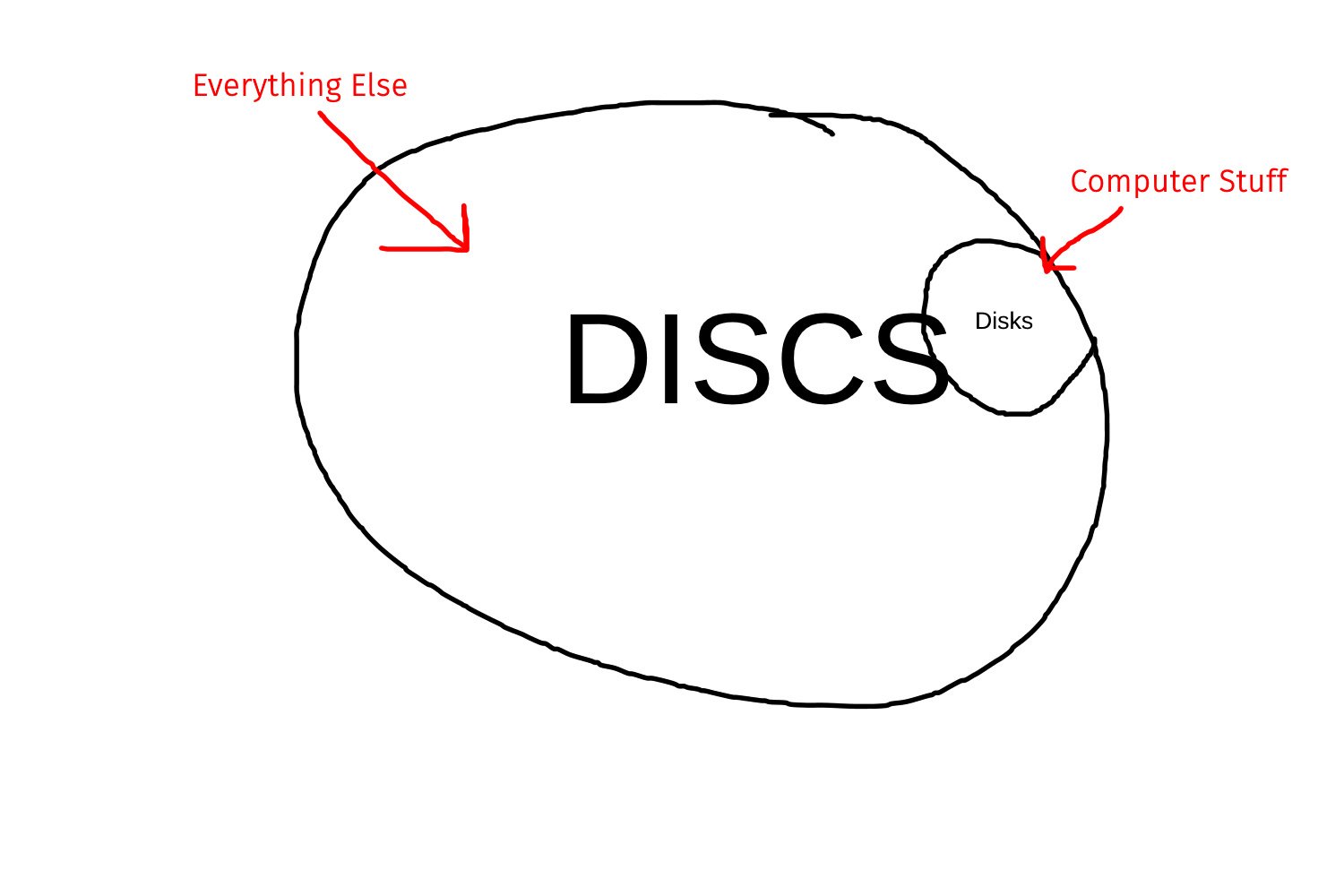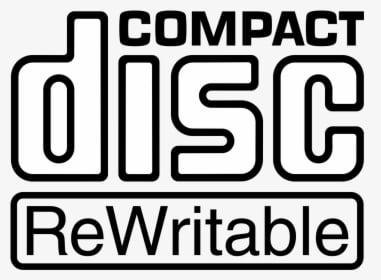I heard some people say theyre the same thing, but others are adamant that they have different meanings. Which is it?
Disk is for things that are more kiki, but disc, with that rounded off c, is for things that are more bouba.
IYKYK.
What about disq?
Round things with antennas
What about disckque
that’s the UK version of dick
And what is Lemmy?
Disc is short for discus.
Disk is short for diskette, the square things some discs are kept in.
Isn’t a diskette just a small version of a disk? Much like kitchenette to kitchen
I don’t think so https://en.m.wikipedia.org/wiki/Floppy_disk
To quote from your source:
8-inch floppy disk, inserted in drive, (3½-inch floppy diskette, in front, shown for scale)
Get outta here with your actual helpful answer
Thats how I interpret it as well.
Disc and disk are varient spellings of the same word that pre-exist computing. Disc is more common in British English, Disk more common in American English. But yeah since computing came along disk has also been used more for magnetic media (hard disk) while disc has been used more for optical media (compact disc). I wouldn’t be surprised if this only happened because of how the CD was marketed and branded as a “compact disc” as a trademark while hard disks and floppy disks etc were more generic terms.
In modern parlance, this has been my working understanding too:
But yeah since computing came along disk has also been used more for magnetic media (hard disk) while disc has been used more for optical media (compact disc).
Optical:
- compact disc
- laser disc
Magnetic:
- 3.5" diskette
- 800GB hard disk drive
…and just to point out there is some disagreement
Magneto-Optical , such as Sony MiniDisc, is sometimes referred to Disc for its optical properties and sometimes as a MO Disk for its magnetic properties.
Bloody English spelling… There’s a reason spelling bees don’t exist in some other languages.
We have a competition for spelling because English spelling is so bad at its job.
I’ve always known disc to refer specifically to optical media.
Disc = round
Disk = rectangular
This is correct in most cases but I don’t think it’s the underlying principle.
This wiki talks about the etymology, with a lot of examples. Most conform to this rule, but there are exceptions in astrophysics like an accretion disk.
Even in info tech, “hard disk” doesn’t really conform to this rule. Like is a hard disk a square hard drive or is it the round thing inside? If it’s the square hard drive, that’s not thin enough to be a “disk”. I’d it’s the round thing inside that would be hard disc, but also creates problems for floppy disk because why refer to the housing in one instance but not another.
Sadly, I think the correct answer is that either refers to a thin flat thing, some spellings are preferred for some uses.
til disk is actually preferred in American English. from your link:
Usage notes
In most varieties of English, disk is the preferred spelling for magnetic media (hence floppy disk, hard disk, disk drive), whereas disc is preferred for optical media (hence compact disc, digital versatile disc, optical disc). For all other uses, disk is preferred in American English and acceptable in Canadian English, and disc otherwise.
Find me an American who says his car is equipped with “disk brakes.” “Disk” is peculiar to computer magnetic storage media, and “disc” for a round object that probably spins.
https://en.m.wikipedia.org/wiki/Disk_(mathematics) preferred spelling here
https://www.merriam-webster.com/dictionary/disk main entry lists disc as a variant spelling while the entry for disc: https://www.merriam-webster.com/dictionary/disc notes it as a variant spelling of disk
https://www.dictionary.com/browse/disc links to disk
Cambridge online dictionary seems to agree with you more but it’s always been the shittiest of them
Wikipedia tells me that they were initially developed in England and finally patented in Germany, so I’m guessing that’s why the British spelling is used in that case.
I can clarify some of the tech stuff.
A “disk” is a concept. It’s an object which contains data.
“Hard” disks and “floppy” disks are always referring to the rigidity of the internal storage media. 7", 5.25", and 3.5" floppy disks have the same round magnetic storage material. The only difference with a 3.5" floppy disk is that they put a hard case over the floppy disk.
CD, DVD, Blu-ray, etc are both disks and discs, as their typically handled without a caddy/case. So technically both apply.
SSDs are still disks, just solid state, rather than floppy/hard spinning magnetic media.
Technically flash drives are also solid state disks, but we don’t generally conflate the two terms for clarity.
You’re conflating “disk” with “drive”.
An SSD is not a disk.
I mainly use Windows and Microsoft almost exclusively uses “disk” everywhere.
I don’t think you’re wrong at all, but even after I’ve been working in tech for so long, all the terms for everything get confusing for me too.
Just saying.
What about MiniDisc, the storage medium of the future?
Round optical disc in a hard caddy/shell
sir, this is lemmy shitpost. Here’s a citation for thinkin too hard, don’t let it happen again.
What about hard disk drives. The “disks” inside them are round
The hard disk is made with discs.
Well…That almost makes it too simple.
deleted by creator
Discks
Disq
Disque*
Disque?
Way too cumbersome
Disqueue, then.
Dischqueue
All I know is there’s no such thing as a discette.
There is, or was, tho.
umm, are you suggesting that all discs are male???
Discs are asexual. It’s why they can make offspring without a partner.
There is a dicklette or so your wife claims.
Could be because c followed by e is usually pronounced “s” rather than “k”
Disque
Diskette
Petit Disk
It’s all disk? 🌎👨🚀
Always has been 🌎👨🚀🔫👨🚀Its a disk when its magnetic, disc when optical.
The way to remember it is that its disk because its magnetik.
What if it’s optikal?
I cannot stress enough how efficiently you ruined my ability to use the memory trick.
Just remember the c in disc is shaped like a magnet.
Now you’ve gone and made things worse.
Is a VHS tape a disk then?
No, that’s a tape. It has to be dis(c/k) shaped to be a disk.
the tape spooled up on the reel inside a VHS looks like a thi(c/k) dis(c/k)
deleted by creator
thic(k/c)
more disk shaped than flash memory.
Including fridge magnets?
deleted by creator
disck
Disque
Disquette
My god I have not laughed that hard in a long time
But what if it’s magnetic?
deleted by creator
No a disc is round
ur a disc
Is a plate optical or magnetic?
Depends on how you store data on it. If you write with a pen its optical.
I usually store food on them
So… neither?
A CD is a disk that is disc shaped.
I am not sure, but my oldest child was looking at an English brochure for a trip to France and a asked me "what the heck is a dis-coth-a-cue? Discotheque. A Disco, a dance club. And yes disco-tek is spelled Discotheque in English.
Not in America it ain’t. Here it’s spelled “Disco is dead.”

Cool…
As others have said and how I always see it:
- Discs are small, circular, flat objects, e.g. the discus;
- Disks are discs used for computer stuff, e.g. floppy disk(ettes), CD-ROMs, DVD-ROMs, hard disks, and so forth…
In other words, all disks are discs, but not all discs are disks.
Here’s a shitty drawing I made to illustrate:

But…

I was wondering how CD-RW works, if anyone else wants to know:
https://electronics.howstuffworks.com/question655.htm
They have a layer that can change between clear and opaque that is changed by having different temperatures applied to it.
upvoted for your spiffy drawing, although i don’t agree with it
Lol, thanks.
What about my distinction do you disagree with, though?
I don’t think the differentiation makes any sense at all.
edit: to clarify-- this isn’t a criticism of the op’s sketch; i just don’t think any attempt makes sense
my attempt to simplify the above explanation; -disc =round -disk =storage
Storage can be round but not all round things are storage
But that doesn’t cover the round storage we call compact discs. It’s just nonsensical
I mean to me compact disc sounds like small and round. Just happens to also be storage media 🤷♂️
There’s nothing wrong with over thinking a shitpost, right?
Does not make send but it is true though.
Computer usage doesn’t determine that you spell it with a k.
A disk is indeed short for diskette, and disc is short for discus.
However, you can absolutely use a compact disc on a computer.
And while there are typically spinning platters or spinning magnetic strips inside hard drive disks or floppy disks, they are referred to by the whole unit as a logical disk drive that you’d see in computer.
If it’s possible to find them all now, you’d see that DVDs, CDs, Blu-ray, laserdisc, are all spelled like discus. 3.5, 4.5 floppy disks, hard drives, solid state drives, tape drives, etc all spell it disk.
So for the most part, being purely observational, you can see that anything shaped like a frisbee with a hole in it will be a disc, and everything else is a disk.
I think that’s slightly different than your explanation, as the terms are mutually exclusive.
You have to put a segment of “disk” outside of the “disc” set on that Venn diagram. You are forgetting about solid state disks.
But SSD is solid state drive, not solid state disc/disk
I always thought discs were optical and disks were magnetic
At its root this was originally a British vs. American English thing. However, the spelling of “disc” with a C has been used specifically as the trade name of various brands including both the throwable and optical media varieties, which have since become genericized trademarks.
For the optical media side of things, the name was coined by Phillips while they were consorting with Sony to develop the standard and named it the “Compact Disc” to compliment their already existing “Compact Cassette” product. They developed an official logo for the format which spelled it “disc.” That’s been with us ever since.
Volumes of computer storage are now colloquially referred to as “disks” because A) a significant majority of the early computer development milieu in general happened in America where we, or at least IBM, spell it with a K, and B) for a very long time, that’s exactly what they were. Tape and magnetic core memory and wire loop memory were all early developments that ultimately gave way to the longstanding popularity of magnetic platter/disk fixed storage… With some exception granted to tape, which hung around for a very long time but definitely was not a random access storage medium suitable for general purpose applications whereas disks were. It’s probably pure happenstance that the dominant non-fixed computer storage media also wound up being disk shaped, namely the various sizes and types of floppy disks. Computers handle linear tape based storage and random access disk based storage very differently, and nowadays random access permanent storage still has the “disk” moniker stuck to it even though it’s now likely to be solid state.
As a generalized descriptor of a flat circular object, either “disk” or “disc” is appropriate but which is preferred seems to be largely depending on which continent you’re from. The root of the word is indeed the Greek “discus,” as in the object yeeted across the playing field by Olympic contestants.
For the optical media side of things, the name was coined by Phillips while they were consorting with Sony to develop the standard and named it the “Compact Disc” to compliment their already existing “Compact Cassette” product. They developed an official logo for the format which spelled it “disc.” That’s been with us ever since.
Didn’t LaserDisc predate Compact Discs?
It did. That may have influenced the naming convention. The LaserDisc was actually originally conceived as the “DiscoVision.” And if that name isn’t a veritable time capsule of its era, I don’t know what is.
Oh interesting…the plot thickens!
















